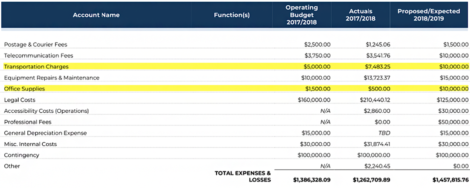A University of Toronto Students’ Union (UTSU) committee has recommended that the UTSU terminate its decade-old agreement with the University of Toronto Mississauga Students’ Union (UTMSU). The recommendation was announced at the UTSU’s Board of Directors meeting on August 15 and came after months of negotiations between the two student unions.
Following the August 15 meeting, an emergency UTSU board meeting was called on August 22 to discuss the UTSU’s 2018–2019 Operating Budget, which included large increases in areas such as office supplies and transportation. The jump in these line items was attributed to the upcoming opening of the Student Commons, which was recently delayed from Fall 2018 to January 2019.
The board meetings also saw some tension between board members and executives, with directors questioning late executive reports. In an unusual move, the board also voted down a motion presented by the executives, which proposed moving up the date of September by-elections.
Termination of UTMSU agreement
Since 2008, the UTSU and the UTMSU have been in an Associate Membership Agreement (AMA) that has linked the two groups in areas of governance and services. All UTM students belong to both unions, and the UTSU remits a portion of fees paid by those students back to the UTMSU.
Talks began in January 2018 to renegotiate the AMA, but they have apparently broken down since the UTSU’s Ad Hoc Negotiations Committee has formally recommended that the AMA “be terminated, contingent on expected negotiation results,” according to UTSU President Anne Boucher.
A termination of the agreement would mean a huge restructuring of how both unions function, changing everything from the makeup of their boards to the services that they provide. For instance, the UTMSU would be allowed to conduct its own advocacy work, which the current AMA does not permit.
2018–2019 budget
The August 22 emergency meeting was called to discuss the budget because the documents were released “too late for people to be able to review it in time,” according to UTSU Vice-President University Affairs Joshua Grondin. The budget wasn’t released until a few hours before the meeting by Vice-President Internal Tyler Biswurm.
Notable increases include office supplies, which went up from $1,500 to $10,000, as well as a doubling in the budget for transportation from $5,000 to $10,000.
Biswurm said that the increase in office supplies reflect one-time costs due to the imminent move to the Student Commons building.
For transportation, Biswurm explained that the uptick was to fix mistakes in last year’s budget, which underestimated the cost of transportation and resulted in overspending by $2,483.25.
According to Biswurm, the discrepancy also happened because “transportation expenses that should have been charged to the Transportation account were mistakenly categorized” into the wrong accounts, such as for events and conferences.
Tension at board meeting
In a rare turn of events, a motion failed at the August 15 board meeting. The motion was to move the notice of the UTSU’s by-elections from September 20 to September 6.
Boucher explained that the motion “would have allowed students more time to consider running in the UTSU by-elections.” The positions available for running include those in Kinesiology, Theology, and Law, along with possible positions available due to the resignation of members.
But board members “pointed out that [September 6] may be too early for students to properly consider candidacy, and suggested the election period range be shortened in lieu,” wrote Boucher in a statement.
Innis College Director Lucas Granger wrote to The Varsity that he voted against the motion because releasing the by-elections notice “on the first day of classes leaves first-years specifically in the dark,” since the notice may be crowded out by other back-to-school announcements.
Also brought to issue at the meeting were the many missing Executive Reports, which is a summary of the month that each UTSU executive is mandated to present at board meetings.
Reports from Biswurm, Vice-President Equity Ammara Wasim, and Vice-President External Affairs Yuli Liu were all missing. Biswurm also did not submit his June Executive Report.
When asked by Granger why his reports were missing, Biswurm responded, “It has mostly to do with the fact that I’m bad at scheduling.”
Biswurm explained that he dedicated more time to writing the operating budget and apologized for not having his reports up.
“I figured if you want me I can give a verbal report but there is no written version. It’s not written at all; I would not be able to submit it now.”
The absence of reports was also raised by Academic Director of Social Sciences Joshua Bowman, who said at the meeting, “I’m concerned with the fact that I’m unaware of what the Vice-President Equity is doing, due to the fact that the Executive Report was not submitted.” Wasim responded that it was “done on time,” but her assistant did not submit it to Biswurm.
Bowman later wrote to The Varsity, “We as students consistently have to work with deadlines when handing in essays or submitting projects. Our elected Executive should be no exception, especially when acting on our behalf.”
In other business, the UTSU continues to leave two student positions on the CIUT 89.5 FM Board of Directors unfulfilled. CIUT is U of T’s campus radio station, and its board reserves two seats for UTSU appointees, which have been vacant since March 4.
This vacancy came after then-appointees, Boucher and former UTSU executive Stuart Norton, resigned, citing “antagony, intimidation, and dismissal” in response to their criticism of the CIUT’s handling of a “sexual harassment complaint” by CIUT host Jamaias DaCosta against a co-host. They also accused CIUT of an “undemocratic” elections process.
Justifying the continued vacation of the student positions, Boucher said that the voices of new appointees “were not something that [the CIUT] wanted to hear,” and she would not “feel comfortable sending a student into that situation.”



